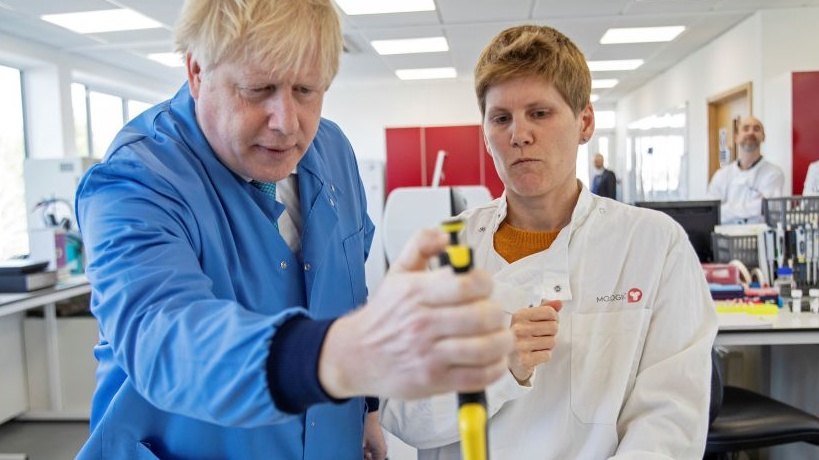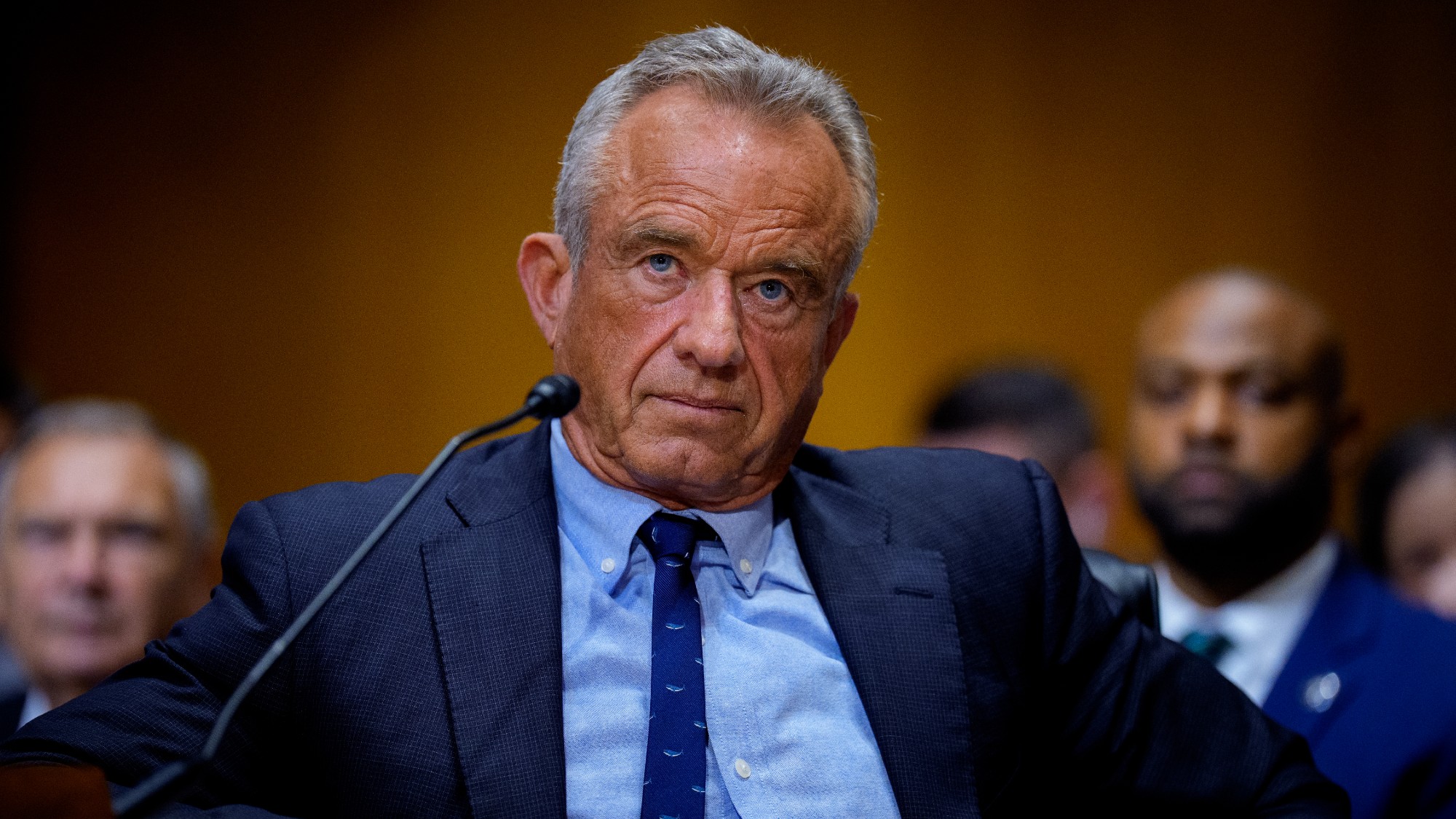Why do vaccines take so long to produce?
Scientists believe developing a coronavirus vaccine could take at least 18 months

A free daily email with the biggest news stories of the day – and the best features from TheWeek.com
You are now subscribed
Your newsletter sign-up was successful
Donald Trump has angered European politicians after allegedly offering a German company $1bn (£800m) for exclusive rights to a future coronavirus vaccine.
The president’s offer prompted one German minister to warn Trump that “Germany is not for sale”, while the company in question – biopharmaceutical firm CureVac – says that any vaccine will be “for the whole world and not individual countries”.
The World Health Organization (WHO) has warned that it may be 18 months before a vaccine for the coronavirus is publicly available, despite a global effort to find a treatment.
The Week
Escape your echo chamber. Get the facts behind the news, plus analysis from multiple perspectives.

Sign up for The Week's Free Newsletters
From our morning news briefing to a weekly Good News Newsletter, get the best of The Week delivered directly to your inbox.
From our morning news briefing to a weekly Good News Newsletter, get the best of The Week delivered directly to your inbox.
So why does it take so long to develop a vaccine?
How do vaccines work?
As the BBC reports, vaccines work by introducing a small amount of a virus or bacteria to the immune system. This means that when the body comes into contact with the illness for real, it recognises it as an “invader” and knows how to fight it.
This is how vaccinations for seasonal flu, measles, mumps and rubella are made, by introducing weak versions of those viruses – that cannot cause a full-blown infection – to the immune system.
A free daily email with the biggest news stories of the day – and the best features from TheWeek.com
But, as the BBC’s health and science correspondent James Gallagher notes, the work to develop a coronavirus vaccine is using “newer, and less tested, approaches called ‘plug and play’ vaccines”.
This method sees scientists lifting sections of the coronavirus’s genetic code and putting it into other, totally harmless, viruses. This, Gallagher reports, means that you can “infect” someone with the bug, giving some immunity against infection from the real coronavirus.
–––––––––––––––––––––––––––––––For a round-up of the most important stories from around the world - and a concise, refreshing and balanced take on the week’s news agenda - try The Week magazine. Start your trial subscription today –––––––––––––––––––––––––––––––
What stage of development are we at?
Rob Grenfell, director of health and biosecurity at Australia’s national science agency, writes that China first shared the genetic code of the virus in early January.
By late January, he says, the virus was successfully grown outside China for the first time. This allowed researchers in other countries to gain access to a live sample of the virus, kick-starting the “plug and play” experiments to develop a vaccine.
WHO chief Tedros Adhanom Ghebreyesus has said that a vaccine could be available within 18 months, but first scientists must understand the virus’s characteristics and behaviour in humans.
Once this is achieved, Grenfell says, animal testing can begin, before the vaccine is tested in trials using humans to ensure its safety.
The German company Trump allegedly tried to approach says that it is hoping to have an experimental vaccine developed by June or July. This will then have to be extensively tested in human trials.
US-based biotechnology company Novavax began testing a number of new coronavirus vaccines on animals in late February. It has been reported that these tests should identify the “optimal” vaccine to then test on humans.
Grenfell notes that vaccines have historically taken two to five years to develop. However, he adds that with a global effort to produce a viable coronavirus vaccine, researchers could potentially develop a vaccine in a much shorter time.
What are the challenges?
As The Guardian reports, the timeline of 18 months for a vaccine assumes that “there will be no hitches” in the process of developing and testing.
Annelies Wilder-Smith, professor of emerging infectious diseases at the London School of Hygiene and Tropical Medicine, told the paper: “Like most vaccinologists, I don’t think this vaccine will be ready before 18 months.”
As the paper notes, most vaccines take a decade or more to get regulatory approval, meaning that 18 months would be “extremely fast”.
Another problem is that once developed, large quantities of the vaccines are going to be needed at very short notice. This, the Guardian reports, could be a stumbling block as many organisations in the Covid-19 vaccine race “simply don’t have the necessary production capacity”.
Financing the research and production of a vaccine is also risky for pharmaceutical companies, as many candidates do not ever make it into production.
The global vaccine market is expected to grow to $60bn (£46bn) this year, but profits are by no means guaranteed in the field, mainly because of the money and time spent on the process of getting the drug to market.
However, as Grenfell notes, the knowledge gained by the global scientific community in the race to develop a vaccine following the 2003 Sars outbreak has given us a “head-start” on developing one for coronavirus.
-
 The ‘ravenous’ demand for Cornish minerals
The ‘ravenous’ demand for Cornish mineralsUnder the Radar Growing need for critical minerals to power tech has intensified ‘appetite’ for lithium, which could be a ‘huge boon’ for local economy
-
 Why are election experts taking Trump’s midterm threats seriously?
Why are election experts taking Trump’s midterm threats seriously?IN THE SPOTLIGHT As the president muses about polling place deployments and a centralized electoral system aimed at one-party control, lawmakers are taking this administration at its word
-
 ‘Restaurateurs have become millionaires’
‘Restaurateurs have become millionaires’Instant Opinion Opinion, comment and editorials of the day
-
 NIH director Bhattacharya tapped as acting CDC head
NIH director Bhattacharya tapped as acting CDC headSpeed Read Jay Bhattacharya, a critic of the CDC’s Covid-19 response, will now lead the Centers for Disease Control and Prevention
-
 How corrupt is the UK?
How corrupt is the UK?The Explainer Decline in standards ‘risks becoming a defining feature of our political culture’ as Britain falls to lowest ever score on global index
-
 Childhood vaccines: RFK Jr. escalates his war
Childhood vaccines: RFK Jr. escalates his warFeature The health secretary cut the number of recommended childhood vaccines from 17 to 11
-
 The high street: Britain’s next political battleground?
The high street: Britain’s next political battleground?In the Spotlight Mass closure of shops and influx of organised crime are fuelling voter anger, and offer an opening for Reform UK
-
 Is a Reform-Tory pact becoming more likely?
Is a Reform-Tory pact becoming more likely?Today’s Big Question Nigel Farage’s party is ahead in the polls but still falls well short of a Commons majority, while Conservatives are still losing MPs to Reform
-
 Asylum hotels: everything you need to know
Asylum hotels: everything you need to knowThe Explainer Using hotels to house asylum seekers has proved extremely unpopular. Why, and what can the government do about it?
-
 Taking the low road: why the SNP is still standing strong
Taking the low road: why the SNP is still standing strongTalking Point Party is on track for a fifth consecutive victory in May’s Holyrood election, despite controversies and plummeting support
-
 Behind the ‘Boriswave’: Farage plans to scrap indefinite leave to remain
Behind the ‘Boriswave’: Farage plans to scrap indefinite leave to remainThe Explainer The problem of the post-Brexit immigration surge – and Reform’s radical solution